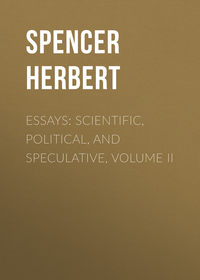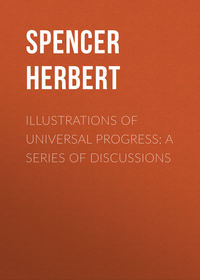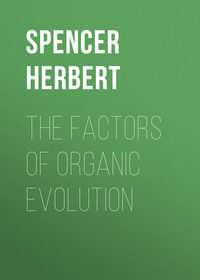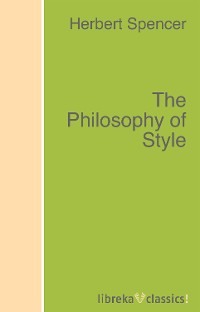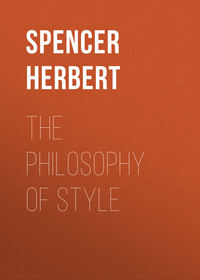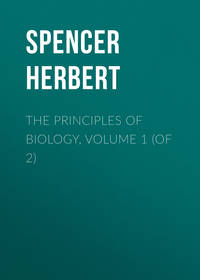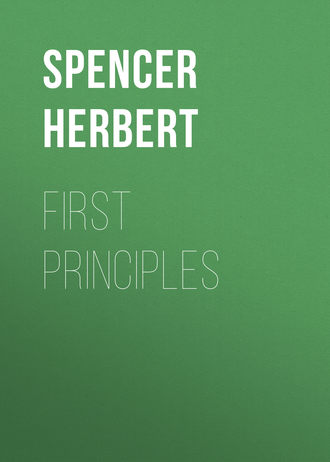 полная версия
полная версияFirst Principles
Deep down then in the very nature of Life, the relativity of our knowledge is discernible. The analysis of vital actions in general, leads not only to the conclusion that things in themselves cannot be known to us; but also to the conclusion that knowledge of them, were it possible, would be useless.
§ 26. There still remains the final question – What must we say concerning that which transcends knowledge? Are we to rest wholly in the consciousness of phenomena? – is the result of inquiry to exclude utterly from our minds everything but the relative? or must we also believe in something beyond the relative?
The answer of pure logic is held to be, that by the limits of our intelligence we are rigorously confined within the relative; and that anything transcending the relative can be thought of only as a pure negation, or as a non-existence. “The absolute is conceived merely by a negation of conceivability,” writes Sir William Hamilton. “The Absolute and the Infinite” says Mr Mansel, “are thus, like the Inconceivable and the Imperceptible, names indicating, not an object of thought or of consciousness at all, but the mere absence of the conditions under which consciousness is possible.” From each of which extracts may be deduced the conclusion, that since reason cannot warrant us in affirming the positive existence of what is cognizable only as a negation, we cannot rationally affirm the positive existence of anything beyond phenomena.
Unavoidable as this conclusion seems, it involves, I think, a grave error. If the premiss be granted, the inference must doubtless be admitted; but the premiss, in the form presented by Sir William Hamilton and Mr Mansel, is not strictly true. Though, in the foregoing pages, the arguments used by these writers to show that the Absolute is unknowable, have been approvingly quoted; and though these arguments have been enforced by others equally thoroughgoing; yet there remains to be stated a qualification, which saves us from that scepticism otherwise necessitated. It is not to be denied that so long as we confine ourselves to the purely logical aspect of the question, the propositions quoted above must be accepted in their entirety; but when we contemplate its more general, or psychological, aspect, we find that these propositions are imperfect statements of the truth: omitting, or rather excluding, as they do, an all-important fact. To speak specifically: – Besides that definite consciousness of which Logic formulates the laws, there is also an indefinite consciousness which cannot be formulated. Besides complete thoughts, and besides the thoughts which though incomplete admit of completion, there are thoughts which it is impossible to complete; and yet which are still real, in the sense that they are normal affections of the intellect.
Observe in the first place, that every one of the arguments by which the relativity of our knowledge is demonstrated, distinctly postulates the positive existence of something beyond the relative. To say that we cannot know the Absolute, is, by implication, to affirm that there is an Absolute. In the very denial of our power to learn what the Absolute is, there lies hidden the assumption that it is; and the making of this assumption proves that the Absolute has been present to the mind, not as a nothing, but as a something. Similarly with every step in the reasoning by which this doctrine is upheld. The Noumenon, everywhere named as the antithesis of the Phenomenon, is throughout necessarily thought of as an actuality. It is rigorously impossible to conceive that our knowledge is a knowledge of Appearances only, without at the same time conceiving a Reality of which they are appearances; for appearance without reality is unthinkable. Strike out from the argument the terms Unconditioned, Infinite, Absolute, with their equivalents, and in place of them write, “negation of conceivability,” or “absence of the conditions under which consciousness is possible,” and you find that the argument becomes nonsense. Truly to realize in thought any one of the propositions of which the argument consists, the Unconditioned must be represented as positive and not negative. How then can it be a legitimate conclusion from the argument, that our consciousness of it is negative? An argument, the very construction of which assigns to a certain term a certain meaning, but which ends in showing that this term has no such meaning, is simply an elaborate suicide. Clearly, then, the very demonstration that a definite consciousness of the Absolute is impossible to us, unavoidably presupposes an indefinite consciousness of it.
Perhaps the best way of showing that by the necessary conditions of thought, we are obliged to form a positive though vague consciousness of this which transcends distinct consciousness, is to analyze our conception of the antithesis between Relative and Absolute. It is a doctrine called in question by none, that such antinomies of thought as Whole and Part, Equal and Unequal, Singular and Plural, are necessarily conceived as correlatives: the conception of a part is impossible without the conception of a whole; there can be no idea of equality without one of inequality. And it is admitted that in the same manner, the Relative is itself conceivable as such, only by opposition to the Irrelative or Absolute. Sir William Hamilton however, in his trenchant (and in most parts unanswerable) criticism on Cousin, contends, in conformity with his position above stated, that one of these correlatives is nothing whatever beyond the negation of the other. “Correlatives” he says “certainly suggest each other, but correlatives may, or may not, be equally real and positive. In thought contradictories necessarily imply each other, for the knowledge of contradictories is one. But the reality of one contradictory, so far from guaranteeing the reality of the other, is nothing else than its negation. Thus every positive notion (the concept of a thing by what it is) suggests a negative notion (the concept of a thing by what it is not); and the highest positive notion, the notion of the conceivable, is not without its corresponding negative in the notion of the inconceivable. But though these mutually suggest each other, the positive alone is real; the negative is only an abstraction of the other, and in the highest generality, even an abstraction of thought itself.” Now the assertion that of such contradictories “the negative is only an abstraction of the other” – “is nothing else than its negation,” – is not true. In such correlatives as Equal and Unequal, it is obvious enough that the negative concept contains something besides the negation of the positive one; for the things of which equality is denied are not abolished from consciousness by the denial. And the fact overlooked by Sir William Hamilton, is, that the like holds even with those correlatives of which the negative is inconceivable, in the strict sense of the word. Take for example the Limited and the Unlimited. Our notion of the Limited is composed, firstly of a consciousness of some kind of being, and secondly of a consciousness of the limits under which it is known. In the antithetical notion of the Unlimited, the consciousness of limits is abolished; but not the consciousness of some kind of being. It is quite true that in the absence of conceived limits, this consciousness ceases to be a concept properly so called; but it is none the less true that it remains as a mode of consciousness. If, in such cases, the negative contradictory were, as alleged, “nothing else” than the negation of the other, and therefore a mere nonentity, then it would clearly follow that negative contradictories could be used interchangeably: the Unlimited might be thought of as antithetical to the Divisible; and the Indivisible as antithetical to the Limited. While the fact that they cannot be so used, proves that in consciousness the Unlimited and the Indivisible are qualitatively distinct, and therefore positive or real; since distinction cannot exist between nothings. The error, (very naturally fallen into by philosophers intent on demonstrating the limits and conditions of consciousness,) consists in assuming that consciousness contains nothing but limits and conditions; to the entire neglect of that which is limited and conditioned. It is forgotten that there is something which alike forms the raw material of definite thought and remains after the definiteness which thinking gave to it has been destroyed. Now all this applies by change of terms to the last and highest of these antinomies – that between the Relative and the Non-relative. We are conscious of the Relative as existence under conditions and limits; it is impossible that these conditions and limits can be thought of apart from something to which they give the form; the abstraction of these conditions and limits, is, by the hypothesis, the abstraction of them only; consequently there must be a residuary consciousness of something which filled up their outlines; and this indefinite something constitutes our consciousness of the Non-relative or Absolute. Impossible though it is to give to this consciousness any qualitative or quantitative expression whatever, it is not the less certain that it remains with us as a positive and indestructible element of thought.
Still more manifest will this truth become when it is observed that our conception of the Relative itself disappears, if our conception of the Absolute is a pure negation. It is admitted, or rather it is contended, by the writers I have quoted above, that contradictories can be known only in relation to each other – that Equality, for instance, is unthinkable apart from its correlative Inequality; and that thus the Relative can itself be conceived only by opposition to the Non-relative. It is also admitted, or rather contended, that the consciousness of a relation implies a consciousness of both the related members. If we are required to conceive the relation between the Relative and Non-relative without being conscious of both, “we are in fact” (to quote the words of Mr Mansel differently applied) “required to compare that of which we are conscious with that of which we are not conscious; the comparison itself being an act of consciousness, and only possible through the consciousness of both its objects.” What then becomes of the assertion that “the Absolute is conceived merely by a negation of conceivability,” or as “the mere absence of the conditions under which consciousness is possible?” If the Non-relative or Absolute, is present in thought only as a mere negation, then the relation between it and the Relative becomes unthinkable, because one of the terms of the relation is absent from consciousness. And if this relation is unthinkable, then is the Relative itself unthinkable, for want of its antithesis: whence results the disappearance of all thought whatever.
Let me here point out that both Sir Wm Hamilton and Mr Mansel, do, in other places, distinctly imply that our consciousness of the Absolute, indefinite though it is, is positive and not negative. The very passage already quoted from Sir Wm Hamilton, in which he asserts that “the absolute is conceived merely by a negation of conceivability,” itself ends with the remark that, “by a wonderful revelation, we are thus, in the very consciousness of our inability to conceive aught above the relative and finite, inspired with a belief in the existence of something unconditioned beyond the sphere of all comprehensible reality.” The last of these assertions practically admits that which the other denies. By the laws of thought as Sir Wm Hamilton has interpreted them, he finds himself forced to the conclusion that our consciousness of the Absolute is a pure negation. He nevertheless finds that there does exist in consciousness an irresistible conviction of the real “existence of something unconditioned.” And he gets over the inconsistency by speaking of this conviction as “a wonderful revelation” – “a belief” with which we are “inspired:” thus apparently hinting that it is supernaturally at variance with the laws of thought. Mr Mansel is betrayed into a like inconsistency. When he says that “we are compelled, by the constitution of our minds, to believe in the existence of an Absolute and Infinite Being, – a belief which appears forced upon us, as the complement of our consciousness of the relative and the finite;” he clearly says by implication that this consciousness is positive, and not negative. He tacitly admits that we are obliged to regard the Absolute as something more than a negation – that our consciousness of it is not “the mere absence of the conditions under which consciousness is possible.”
The supreme importance of this question must be my apology for taxing the reader’s attention a little further, in the hope of clearing up the remaining difficulties. The necessarily positive character of our consciousness of the Unconditioned, which, as we have seen, follows from an ultimate law of thought, will be better understood on contemplating the process of thought.
One of the arguments used to prove the relativity of our knowledge, is, that we cannot conceive Space or Time as either limited or unlimited. It is pointed out that when we imagine a limit, there simultaneously arises the consciousness of a space or time existing beyond the limit. This remoter space or time, though not contemplated as definite, is yet contemplated as real. Though we do not form of it a conception proper, since we do not bring it within bounds, there is yet in our minds the unshaped material of a conception. Similarly with our consciousness of Cause. We are no more able to form a circumscribed idea of Cause, than of Space or Time; and we are consequently obliged to think of the Cause which transcends the limits of our thought as positive though indefinite. Just in the same manner that on conceiving any bounded space, there arises a nascent consciousness of space outside the bounds; so, when we think of any definite cause, there arises a nascent consciousness of a cause behind it: and in the one case as in the other, this nascent consciousness is in substance like that which suggests it, though without form. The momentum of thought inevitably carries us beyond conditioned existence to unconditioned existence; and this ever persists in us as the body of a thought to which we can give no shape.
Hence our firm belief in objective reality – a belief which metaphysical criticisms cannot for a moment shake. When we are taught that a piece of matter, regarded by us as existing externally, cannot be really known, but that we can know only certain impressions produced on us, we are yet, by the relativity of our thought, compelled to think of these in relation to a positive cause – the notion of a real existence which generated these impressions becomes nascent. If it be proved to us that every notion of a real existence which we can frame, is utterly inconsistent with itself – that matter, however conceived by us, cannot be matter as it actually is, our conception, though transfigured, is not destroyed: there remains the sense of reality, dissociated as far as possible from those special forms under which it was before represented in thought. Though Philosophy condemns successively each attempted conception of the Absolute – though it proves to us that the Absolute is not this, nor that, nor that – though in obedience to it we negative, one after another, each idea as it arises; yet, as we cannot expel the entire contents of consciousness, there ever remains behind an element which passes into new shapes. The continual negation of each particular form and limit, simply results in the more or less complete abstraction of all forms and limits; and so ends in an indefinite consciousness of the unformed and unlimited.
And here we come face to face with the ultimate difficulty – How can there possibly be constituted a consciousness of the unformed and unlimited, when, by its very nature, consciousness is possible only under forms and limits? If every consciousness of existence is a consciousness of existence as conditioned, then how, after the negation of conditions, can there be any residuum?. Though not directly withdrawn by the withdrawal of its conditions, must not the raw material of consciousness be withdrawn by implication? Must it not vanish when the conditions of its existence vanish? That there must be a solution of this difficulty is manifest; since even those who would put it, do, as already shown, admit that we have some such consciousness; and the solution appears to be that above shadowed forth. Such consciousness is not, and cannot be, constituted by any single mental act; but is the product of many mental acts. In each concept there is an element which persists. It is alike impossible for this element to be absent from consciousness, and for it to be present in consciousness alone: either alternative involves unconsciousness – the one from the want of the substance; the other from the want of the form. But the persistence of this element under successive conditions, necessitates a sense of it as distinguished from the conditions, and independent of them. The sense of a something that is conditioned in every thought, cannot be got rid of, because the something cannot be got rid of. How then must the sense of this something be constituted? Evidently by combining successive concepts deprived of their limits and conditions. We form this indefinite thought, as we form many of our definite thoughts, by the coalescence of a series of thoughts. Let me illustrate this. A large complex object, having attributes too numerous to be represented at once, is yet tolerably well conceived by the union of several representations, each standing for part of its attributes. On thinking of a piano, there first rises in imagination its visual appearance, to which are instantly added (though by separate mental acts) the ideas of its remote side and of its solid substance. A complete conception, however, involves the strings, the hammers, the dampers, the pedals; and while successively adding these to the conception, the attributes first thought of lapse more or less completely out of consciousness. Nevertheless, the whole group constitutes a representation of the piano. Now as in this case we form a definite concept of a special existence, by imposing limits and conditions in successive acts; so, in the converse case, by taking away the limits and conditions in successive acts, we form an indefinite notion of general existence. By fusing a series of states of consciousness, in each of which, as it arises, the limitations and conditions are abolished, there is produced a consciousness of something unconditioned. To speak more rigorously: – this consciousness is not the abstract of any one group of thoughts, ideas, or conceptions; but it is the abstract of all thoughts, ideas, or conceptions. That which is common to them all, and cannot be got rid of, is what we predicate by the word existence. Dissociated as this becomes from each of its modes by the perpetual change of those modes, it remains as an indefinite consciousness of something constant under all modes – of being apart from its appearances. The distinction we feel between special and general existence, is the distinction between that which is changeable in us, and that which is unchangeable. The contrast between the Absolute and the Relative in our minds, is really the contrast between that mental element which exists absolutely, and those which exist relatively.
By its very nature, therefore, this ultimate mental element is at once necessarily indefinite and necessarily indestructible. Our consciousness of the unconditioned being literally the unconditioned consciousness, or raw material of thought to which in thinking we give definite forms, it follows that an ever-present sense of real existence is the very basis of our intelligence. As we can in successive mental acts get rid of all particular conditions and replace them by others, but cannot get rid of that undifferentiated substance of consciousness which is conditioned anew in every thought; there ever remains with us a sense of that which exists persistently and independently of conditions. At the same time that by the laws of thought we are rigorously prevented from forming a conception of absolute existence; we are by the laws of thought equally prevented from ridding ourselves of the consciousness of absolute existence: this consciousness being, as we here see, the obverse of our self-consciousness. And since the only possible measure of relative validity among our beliefs, is the degree of their persistence in opposition to the efforts made to change them, it follows that this which persists at all times, under all circumstances, and cannot cease until consciousness ceases, has the highest validity of any.
To sum up this somewhat too elaborate argument: – We have seen how in the very assertion that all our knowledge, properly so called, is Relative, there is involved the assertion that there exists a Non-relative. We have seen how, in each step of the argument by which this doctrine is established, the same assumption is made. We have seen how, from the very necessity of thinking in relations, it follows that the Relative is itself inconceivable, except as related to a real Non-relative. We have seen that unless a real Non-relative or Absolute be postulated, the Relative itself becomes absolute; and so brings the argument to a contradiction. And on contemplating the process of thought, we have equally seen how impossible it is to get rid of the consciousness of an actuality lying behind appearances; and how, from this impossibility, results our indestructible belief in that actuality.
CHAPTER V.
THE RECONCILIATION
§ 27. Thus do all lines of argument converge to the same conclusion. The inference reached à priori. in the last chapter, confirms the inferences which, in the two preceding chapters, were reached à posteriori. Those imbecilities of the understanding that disclose themselves when we try to answer the highest questions of objective science, subjective science proves to be necessitated by the laws of that understanding. We not only learn by the frustration of all our efforts, that the reality underlying appearances is totally and for ever inconceivable by us; but we also learn why, from the very nature of our intelligence, it must be so. Finally we discover that this conclusion, which, in its unqualified form, seems opposed to the instinctive convictions of mankind, falls into harmony with them when the missing qualification is supplied. Though the Absolute cannot in any manner or degree be known, in the strict sense of knowing, yet we find that its positive existence is a necessary datum of consciousness; that so long as consciousness continues, we cannot for an instant rid it of this datum; and that thus the belief which this datum constitutes, has a higher warrant than any other whatever.
Here then is that basis of agreement we set out to seek. This conclusion which objective science illustrates, and subjective science shows to be unavoidable, – this conclusion which, while it in the main expresses the doctrine of the English school of philosophy, recognizes also a soul of truth in the doctrine of the antagonist German school – this conclusion which brings the results of speculation into harmony with those of common sense; is also the conclusion which reconciles Religion with Science. Common Sense asserts the existence of a reality; Objective Science proves that this reality cannot be what we think it; Subjective Science shows why we cannot think of it as it is, and yet are compelled to think of it as existing; and in this assertion of a Reality utterly inscrutable in nature, Religion finds an assertion essentially coinciding with her own. We are obliged to regard every phenomenon as a manifestation of some Power by which we are acted upon; phenomena being, so far as we can ascertain, unlimited in their diffusion, we are obliged to regard this Power as omnipresent; and criticism teaches us that this Power is wholly incomprehensible. In this consciousness of an Incomprehensible Omnipresent Power, we have just that consciousness on which Religion dwells. And so we arrive at the point where Religion and Science coalesce.
To understand fully how real is the reconciliation thus reached, it will be needful to look at the respective attitudes that Religion and Science have all along maintained towards this conclusion. We must observe how, all along, the imperfections of each have been undergoing correction by the other; and how the final out-come of their mutual criticisms, can be nothing else than an entire agreement on this deepest and widest of all truths.


